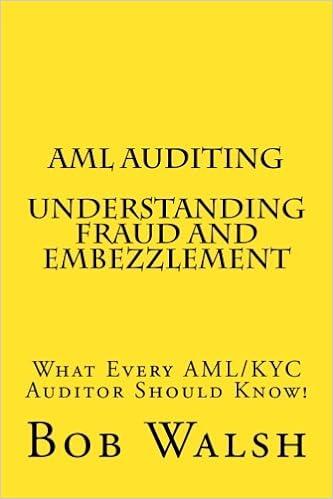Question
Brad MacDonald is pleased with your assistance in preparing his personal financial statements and your suggestions for improving his personal financial situation. He has called
Brad MacDonald is pleased with your assistance in preparing his personal financial statements and your suggestions for improving his personal financial situation. He has called on you for additional guidance. First, he wants to know what factors he should consider when selecting a financial institution. He is mostly interested in financial institutions that will assist him in making investment and money management decisions. He finds savings accounts boring and has no desire to have one because the interest rate is so low. Second, he has decided that it is time to upgrade his car and housing situations; however, he is concerned about his liquidity. His credit card, with a $65 annual fee and 21 percent annual interest rate, compounded daily, is nearing its credit limit of $10 000. He is reluctant to sell his stock to get cash to pay off part of the credit balance. Recall that Brad thinks his stock has the potential to make him rich. Brad is questioning whether to pay off his credit card. He can easily afford the required minimum monthly payment and sees no reason to pay off the balance. In order to address his liquidity concerns, Brad has more closely monitored the cost of his smartphone and his entertainment expenses, reducing them by $50 per month and $150 per month, respectively. As a result, his monthly income now exceeds his expenses. However, now Brad has the urge to upgrade his car and housing situations. Brad is interested in purchasing an SUV for $25 000, which includes all fees and taxes. He still owes $10 000 on his three-year-old sedan, which has 87 000 kilometres on it, and has found a buyer who will pay him $15 000 cash. This would enable him to pay off his current car loan and still have $5000 for a down payment on the SUV. He would finance the remainder of the purchase price for four years at 8 percent, compounded monthly. Anticipating your objections to purchasing the SUV, Brad has an alternate plan to lease the SUV for three years. The terms of the lease are $400 per month, a $0.35 charge per kilometre over 24 000 kilometres annually, and $1200 due upon signing for the first months lease payment and security deposit. Brad would also like to purchase his condo. He can make the purchase with 10 percent down. The total purchase price is $140 000. A mortgage with a five-year term and a 25-year amortization period is available with an annual interest rate of 6 percent, compounded semiannually. The CMHC insurance premium does not need to be added to the mortgage because Brad will pay for it separately. Closing costs due at signing will total $3100. The property taxes on his condo will be $1800 per year, his condo fee is $70 per month, and his householdinsurance will increase by $240 a year if he buys the condo. Heating costs should be about $125 per month. Case Questions 1. What factors should Brad consider in selecting a financial institution? 2. If Brads stock doubles in value over the next five years, what annual return, compounded monthly, would he realize? Based on his projected annualized return, would it be advisable to sell the stock to pay off his credit card? Should Brad consider shopping for a new credit card? If so, how should he go about doing this? 3. Address Brads reluctance to pay off his credit card balance. Show him what he could earn in five years if he paid the credit card balance off and invested the required minimum monthly payment saved at 6 percent, compounded monthly. Note: The required minimum monthly payment is 3 percent of the outstanding balance of $8000. 4. Assume that Brad has managed to pay off his credit card and no longer has a required minimum monthly payment of $250. All other expenses remain the same. Refer to Brads personal cash flow statement that you developed in Part 1. Recompute his expenses to determine whether Brad can afford to: a. Purchase the new car b. Lease the new car c. Purchase the condo d. Purchase the car and the condo e. Lease the car and purchase the condo 5. Based on the information you provided, Brad decides not to buy the condo at this time. How can he save the necessary funds to purchase a condo or house in the future? Be specific in your recommendations. 6. In talking to Brad, you mentioned the increasing threat of identity theft. Brad seems concerned, and after asking him several questions, you determine the following: a. Brad has several credit cards in his wallet but uses only one regularly. He also carries his social insurance card, as he can never remember the number. b. Brad recycles, including old invoices, credit card statements, and bank statements after retaining them for the appropriate legal time period. c. Brad uses his smartphone for virtually all his telephone calls, including ordering merchandise and paying by credit card. Comment on each of these points in terms of the risk of identity theft, and make recommendations to Brad for appropriate changes that will reduce his risk of exposure to identity theft.
Step by Step Solution
There are 3 Steps involved in it
Step: 1

Get Instant Access to Expert-Tailored Solutions
See step-by-step solutions with expert insights and AI powered tools for academic success
Step: 2

Step: 3

Ace Your Homework with AI
Get the answers you need in no time with our AI-driven, step-by-step assistance
Get Started


